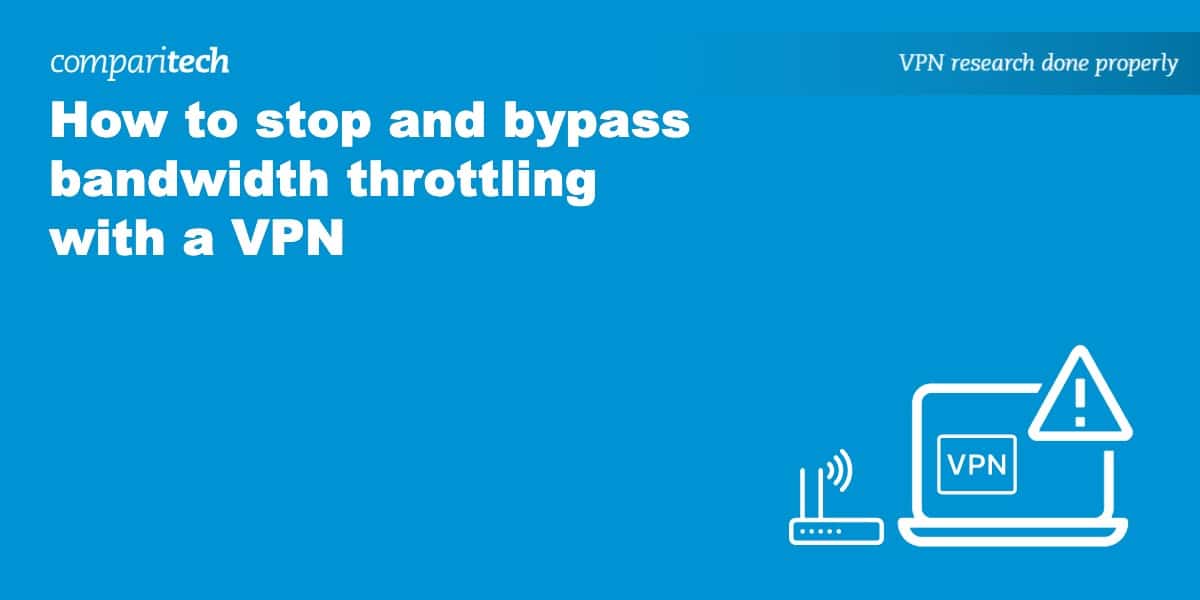Internet service providers throttle bandwidth when you try to stream video, torrent, or access content they deem undesirable. A VPN can help you bypass bandwidth throttling in certain situations.
![]()
Updated: August 15, 2023

Ever experienced a sudden drop in your internet speed while you’re in the middle of something important? That’s bandwidth throttling in action. Typically, it’s your internet providers or mobile carriers flexing their administrative muscles, limiting the available bandwidth in your internet plan. While this practice is rampant in public networks like hotels, cafes, and airports, it’s also a sneaky tactic some internet providers use to manage network congestion. But don’t fret! We’ve got solutions to help you navigate this challenge.
In this guide, we’ll delve into the reasons behind bandwidth throttling and introduce you to the magic of VPNs. With a VPN, you can bypass these speed bumps and get an added layer of privacy, shielding your online activities from prying eyes. Whether you’re looking to secure your connection, access geo-restricted content, or simply enjoy unlimited bandwidth, a VPN has got you covered.
Reasons for throttling your bandwidth can vary from one ISP to another, but here are a few common examples:
Whatever the reason behind ISP throttling, it can significantly impact your internet experience. It can affect streaming speeds, download times, and the overall performance of specific applications. You may also experience higher ping times when playing online games or using voice-over-IP services.
The first two cases can be remedied with a VPN. The VPN’s encryption prevents your ISP and anyone else on the network from seeing the contents of your web traffic while the server disguises that traffic’s destination. VPNs also mask the type of internet traffic, so there’s no way for your ISP to differentiate between VPN traffic from a web browser or a BitTorrent manager, for example.
Not much can be done if yours is the third or fourth case. Save for switching providers; your ISP will always know how much total data and bandwidth you consume. However, many VPNs can compress data before sending it to save bandwidth, which could lower your total data consumption. Some can block ads and other unwanted traffic, saving your precious kilobytes.
Getting set up with a VPN is much simpler than you might think. Just follow our simple step-by-step guide below.
Here’s how to bypass internet throttling with a VPN:
And that’s it! All your internet traffic will now be encrypted and routed through the VPN server. This should allow you to bypass most types of bandwidth throttling, as laid out above. If your ISP was throttling bandwidth for torrents, they should download faster. If it was throttling video, it should now stream smoother.
NordVPN is offering a fully-featured risk-free 30-day trial if you sign up at this page. You can use the VPN rated #1 for bypassing bandwidth throttling with no restrictions for a month—great if you want to binge some shows or need to download some large files.
There are no hidden terms—just contact support within 30 days if you decide NordVPN isn't right for you and you'll get a full refund. Start your NordVPN trial here.
The quickest way to check for throttling is a speed test. Pop over to speedtest.net and give it a whirl. If the results show speeds way below what your internet plan promises, especially during off-peak hours, throttling might be the culprit.
Suspecting a specific website or service is being throttled? Pinpointing this can be a tad trickier. You’ll want to monitor your network speeds while using that particular site or service. Many devices and routers offer this monitoring feature. For instance, Windows 10 users can track network bandwidth via the Performance tab in Task Manager.
A quick tip: Ensure no other gadgets at home are hogging the bandwidth during your tests. Look out for background activities like automatic backups, software updates, or any sneaky malware using your internet.
This depends on where you live. Countries with strict net neutrality laws ban the prioritization of traffic. ISPs in these countries are required to treat all traffic equally and cannot intentionally slow down or speed up specific websites, apps, or services.
Bandwidth throttling is generally legal as long as the throttle applies to all traffic, not specific websites and services.

The FCC’s Open Internet Order requires ISPs in the United States to treat all internet traffic roughly the same way. They cannot discriminate by application or service, device, or content. ISPs are categorized under the same rules as utilities when providing service.
US net neutrality laws are currently under threat, however. The FCC, under the Trump administration, aimed to dismantle the Open Internet Order and instead give the FTC regulatory power over these issues. Critics argue that the FTC will not be able to adequately protect consumers, however, and say the current law should be kept in place.
ISPs want to remove net neutrality laws to provide faster access to products and services that benefit them, such as affiliated video-on-demand sites, while slowing down competing sites. Verizon was caught testing this throttling as recently as July 2017. They could also charge other companies for fast-lane access on their networks.
Related: The best VPNs for the USA to avoid snooping by the NSA

As part of the EU’s Digital Single Market, ISPs cannot block, throttle, or discriminate against online content, applications, and services. Due to Brexit, however, the future of net neutrality in the UK is uncertain.
Prior to the EU law taking effect in 2015, the UK used a voluntary system to keep net neutrality in place. But once the UK leaves the Union, the current law could be scrapped. And since the majority party doesn’t have the greatest record of protecting citizens’ digital rights (see: the snooper’s charter), there’s a possibility that bandwidth throttling could be on the UK’s horizon.

Canadian ISPs are known to throttle the bandwidth of certain protocols. These protocols are detected using deep packet inspection, which identifies the type of traffic traveling through its network. This can be used to reduce the speed of things like peer-to-peer filesharing, which use up large amounts of data and bandwidth. This is sometimes implemented during peak usage hours.
Canadian ISP Rogers has been known to degrade the speeds of all encrypted traffic, which would include VPN traffic.

Australian ISPs are known to engage in zero-rating practices but not so much bandwidth throttling. Due to a more competitive market, it’s not in their best interest to prioritize traffic.
However, the country has not enshrined any actual laws or regulations that prevent bandwidth throttling.
Related: What is the best VPN for Australia?
Zero rating is similar to bandwidth throttling but, unfortunately, cannot be fixed with a VPN. Zero-rating occurs when the ISP doesn’t count traffic to certain websites or services against the user’s data cap.
For example, if AT&T allowed customers to stream videos from HBO Go without expending their monthly data allotment, this would be zero-rating.
Laws and regulations are less clear about zero-rating schemes, but net neutrality proponents are against it. They say it creates an unfair advantage for established players and prevents startups and small businesses from gaining a foothold, thus stifling innovation.
You could, in theory, use a free VPN to bypass bandwidth throttling, but we wouldn’t recommend it. Free VPNs often lack the level of encryption and security features a premium provider offers, such as DNS leak protection and a kill switch. For this reason, there’s no certainty that your online activities are consistently sent via a secure VPN tunnel. If not, your ISP will have traffic visibility, allowing it to throttle your bandwidth.
Bandwidth throttling can affect any device connected to the internet, whether using mobile data or if you’re connected via wifi. No device is safe from throttling unless you use one of the above methods.
There are a few solutions to tackle ISP throttling without resorting to a VPN. Firstly, consider upgrading your internet plan for more bandwidth. If network congestion is the issue, this might help. Secondly, regularly check and ensure your modem and router firmware are updated. Outdated firmware can sometimes cause speed issues. Lastly, consider using a different DNS server, as some users have reported speed improvements by switching from their ISP’s default DNS.
While there isn’t a specific “anti-throttling” device, using a high-quality router can help manage and optimize your network traffic, potentially mitigating the effects of throttling. Some advanced routers come with Quality of Service (QoS) settings that prioritize certain types of traffic, ensuring smoother performance for your most important online activities.